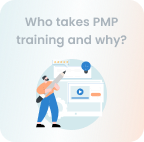







 10 Sep 2024
10 Sep 2024

 12 Sep 2024
12 Sep 2024



A Project Management career involves mastering both the technical and human aspects of a project. Achieving excellence in this field often hinges on obtaining the PMP Certification, which is your ticket to elite status. This blog will guide you through all the PMP Certification Requirements, from essential skills to eligibility criteria. Let’s dive in and equip you with the top-tier knowledge and expertise needed to reach your goals!
Table of Contents
1) What is PMP Certification?
2) PMP Certification Required Conditions
3) Eligibility for PMP Certification
4) Skills for PMP Certification
5) Documents Required for PMP Certification
6) Conclusion
The Project Management Professional (PMP) Certification is a globally recognized credential awarded by the Project Management Institute (PMI). This certification validates the candidate's ability to manage projects and lead teams across diverse industries.

To pursue PMP Certification, applicants must meet specific prerequisites which must demonstrate their Project Management education and experience, including passing PMP Exam Questions. These ensure the background the candidates must have to benefit from the certification. Here are the key requirements for PMP Certification:
This includes two options:
a) A four-year degree (Bachelor’s or global equivalent) and 36 months (about 3 years) of Project Management experience
b) A high school diploma or associate's degree and 60 months (about 5 years) of experience in Project Management.
This includes the following options:
a) 36 months of experience leading projects for four-year degree holders.
b) 60 months of experience leading projects for High school diploma or associate’s degree holders.
c) This experience should be accrued within the last eight years before applying.
All candidates are required to complete 35 hours of Project Management education/training or hold a Certified Associate in Project Management (CAPM) certification. This education can include workshops, formal courses, or training sessions that cover relevant topics.
PMI needs you to meet initial requirements before being eligible to sit for the PMP and PMI-ACP Certification exams. The certification application requires project leadership experience and experience leading Professional Development Units (PDUs). The PMI will review your application, and if you fulfill the requirements, PMI will notify you that you can take the exam. Additionally, understanding PMP Pass Rates can help set realistic expectations for your exam preparation.

 Besides the educational background options mentioned above, the eligibility criteria also includes bachelor's degree or Post-Graduate Degree from a PMI Global Accreditation Center (GAC) accredited program. The requirement involves:
Besides the educational background options mentioned above, the eligibility criteria also includes bachelor's degree or Post-Graduate Degree from a PMI Global Accreditation Center (GAC) accredited program. The requirement involves:
1) Minimum 24 months (about 2 years) of non-overlapping professional Project Management experience
2) 35 contact hours of formal Project Management education
The skills that the PMP Certification validates include:
1) Motivating people and teams through every phase of a successful project.
2) Using agile, predictive and hybrid approaches to pinpoint the best working method for each project.
3) Spotlighting a project's success and its impact on overall organizational goals.
The following documents are necessary for PMP Certification:

1) Proof of Education: Diploma or degree certificates to verify your highest level of education.
2) Project Management Education (As detailed above)
3) Project Management Experience Documentation: Details of the projects managed, including project dates, organization details, roles, and a brief description of your project tasks and achievements. Additional information may include the project supervisor's contact information.
4) Resume or CV: A current resume can provide an overview of your educational background and professional experience.
5) Audit Materials (In case your application gets audited): This includes the following:
a) Copies of your degree or diploma certificates.
b) Signatures from project sponsors or other supervising authorities who can attest to the candidate's professional Project Management experience.
c) Evidence of the 35 contact hours of Project Management education may include attendance records, class syllabus, or completion certificates.
The PMP Certification marks a big step for a Project Manager's career prospects. By meeting the eligibility criteria and skill requirements, you can position yourself as not just a good project manager but also a thinker in the field. Understanding What to Bring to the PMP Exam is essential for a smooth certification process. The PMP Certification Requirements outlined in this Additionally, leveraging the right PMP Study Material will help you prepare effectively, ensuring a solid understanding of key concepts and best practices.






© Copyright 2025. All rights reserved. Contact: PMP® TRAINING ACADEMY.


